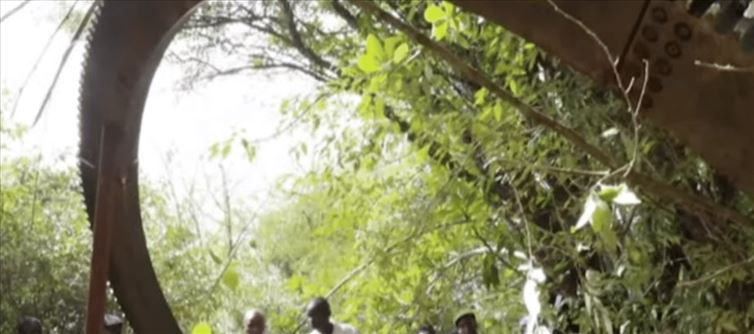Pushpa Telugu Movie Review, Rating
పుష్ప తెలుగు సినిమా రివ్యూ ,రేటింగ్
-
Paul Rudd Breaks Silence on Avengers: Doomsday—and Immediately Says...
-
Star Wars: The Force Awakens (2015) Review — A Thrilling New Hope Undermined by Broken Promises
-
Fallout Season 2 Review — A Bigger, Bolder Wasteland Even If Not Every Path Leads Somewhere
-
The Housemaid Review — A Trashy, Throwback Thriller That Almost Gets Away With It
-
Avatar: Fire and Ash Review - A Colossal, Emotionally Charged Sci-fi Epic That Refuses To Play Safe
-
Global Healthcare Fund Offers $70 Million to Pinnacle Blooms Network to Scale GPT-OS®—World’s First AI-Powered Child Development Operating System
-
Dacoit Teaser Hits Like a Loaded Gun — Love, Lies & Loot
-
No Job? Daughter Unmarried? Son Turned Rogue? Just Chant "Jai Shri Ram" - Problem Solved Says BJP MP in Parliament
-
DMK Fought Jayalalithaa. Vijay Folded. History Matters.
-
IndiGo Walks Free, Citizens Pay the Price: How Corporate Power Hijacked the Indian State
-
“Karthi’s Sardar 2: Sure Shot Blockbuster or Just Hype?”
-
“Is the 3-Hour Runtime the New Norm?”
-
“Sonu Sood Kills It in Gym Pics”
-
“Dacoit Teaser: Sesh Unleashes His Versatile Best”
-
“Can This Be Supported by Palaniswami? I Challenge It” – Chief Minister M.K. Stalin
-
“Would Jayalalithaa Have Agreed to This?” – M.K. Stalin Questions Rural Employment Issue
-
Challenges for DMK’s 2026 Election Manifesto – A Look Back at 2021 Promises
-
Comedy Web Series “Once Upon a Time in Kayamkulam” in the Making
-
Chief Minister M.K. Stalin Criticises VPG Ram G’s 125-Day Employment Scheme
-
DMK Submits Notice in Lok Sabha Against Renaming of 100-Day Employment Scheme
-
DMK Forms Election Manifesto Committee Under MP Kanimozhi’s Leadership
-
Impact of U.S. Tariffs: Chief Minister M.K. Stalin Writes to Prime Minister Modi
-
Chief Minister M.K. Stalin Walks Through Kolathur to Meet the People,
-
“EPS Issued a Statement to Appease Delhi”
-
U.S. Tariff Imposition Poses Challenges to Tamil Nadu’s Export Sector:
-
DMK Forms 12-Member Committee Under MP Kanimozhi to Prepare Election Manifesto
-
“Does the AIADMK Even Hesitate to Oppose the Removal of Gandhi’s Name?
-
U.S. Tariff Imposition Affects Tamil Nadu’s Export Sector:
-
“The New Bill Name of the 100-Day Employment Guarantee Scheme Is Irritating:
-
‘Come Down or No Kiss!’ — Vijay Stopped a Dangerous Fan Stunt Cold
-
“Acting as an Enemy Party Leader, Not the Leader of the Opposition”
-
“Behind My Success Is My Wife” – Chief Minister M.K. Stalin’s Emotional Speech
-
Mirror, Mirror on the Wall—Ashika Ranganath Just Made Mint the Moment
-
Stop Scrolling: Shirley Setia’s Peach Gown Just Defined 2025 Glamour
-
How a Song Launch Turned Into a Nightmare for Nidhhi Agerwal — When Crowd Madness Replaces Civic Sense
-
Hope or Warning for the DCU? Supergirl Reactions Are In
-
James Cameron Declares — The End of Schwarzenegger’s Terminator And Avatar Obsession
-
Biscuit or Bait? Did Priyanka Mohan Just Troll Dhanush on Instagram?
-
Lift the Child, Sanitize the Hands - The Clip That Exposed Pawan Kalyan
-
“My Dog Is My Daughter” — Woman Takes IRS to Court Saying Her Dog Should Be Treated As Child For Tax Purposes
-
$20,000 Back in Your Pocket? Trump’s Tax Cuts Promise a Shockwave
-
Why More Heart Attacks Happen in Winter — And Why Seniors Are Most at Risk
-
She Married ChatGPT — How AI Replaced Human Love
-
When a Metal Detector Becomes God: How Blind Faith Replaced Thinking
-
“Blast Uh Blast Uh” Journalism - Is Polimer News Vijay’s PR Wing Now? Media’s Moral Collapse After Karur
-
How Many Warnings Does Vijay Need Before the Next Tragedy? Is Anyone Accountable in Vijay’s Politics?
-
Before Pandora Burns: 8 Avatar Truths You Must Remember Before Fire & Ash
-
Starting at ₹99 Ending at ₹229: The PVR Combo Scam Exposed
-
From Dignity to Destitution: How the BJP Is Strangling India’s 100-Day Jobs Scheme
-
Forget Filters — This AI Prompt Rewrites Time
-
Raped. Fought Back — And The Court Jailed Her For Life.
-
Forget Retirement — This 92-Year-Old Grandma Just Dominated a Tekken 8 Tournament
Empowering 140+ Indians within and abroad with entertainment, infotainment, credible, independent, issue based journalism oriented latest updates on politics, movies.
India Herald Group of Publishers P LIMITED is MediaTech division of prestigious Kotii Group of Technological Ventures R&D P LIMITED, Which is core purposed to be empowering 760+ crore people across 230+ countries of this wonderful world.
India Herald Group of Publishers P LIMITED is New Generation Online Media Group, which brings wealthy knowledge of information from PRINT media and Candid yet Fluid presentation from electronic media together into digital media space for our users.
With the help of dedicated journalists team of about 450+ years experience; India Herald Group of Publishers Private LIMITED is the first and only true digital online publishing media groups to have such a dedicated team. Dream of empowering over 1300 million Indians across the world to stay connected with their mother land [from Web, Phone, Tablet and other Smart devices] multiplies India Herald Group of Publishers Private LIMITED team energy to bring the best into all our media initiatives such as https://www.indiaherald.com





 click and follow Indiaherald WhatsApp channel
click and follow Indiaherald WhatsApp channel